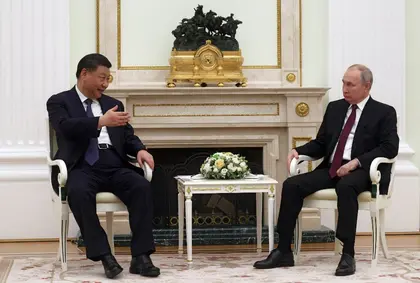Vladimir Putin and Xi Jinping were set to hold a second day of talks on Tuesday, March 21, as the internationally isolated Russian leader said he was open to discussing China's proposals on the fighting in Ukraine.
The sit-down was to be unexpectedly mirrored in Kyiv, where Japanese Prime Minister Fumio Kishida was en route to meet Putin's nemesis Volodymyr Zelensky.
JOIN US ON TELEGRAM
Follow our coverage of the war on the @Kyivpost_official.
Xi's trip to Moscow has been viewed as a major boost for his strategic partner Putin, who is subject to an International Criminal Court warrant over accusations of unlawfully deporting Ukrainian children.
On Monday, Xi and Putin held four and a half hours of talks, calling each other "dear friend."
In a rare move, Putin escorted Xi to his car after the talks, and the two were seen smiling together.
During the meeting, the Russian leader said he was open to talks on Ukraine and praised Beijing's 12-point position paper on the conflict, which includes a call for dialogue and respect for all countries' territorial sovereignty.
China has sought to portray itself as a neutral party in the Ukraine conflict, but Washington has said Beijing's moves could be a "stalling tactic" to help Moscow.
US Secretary of State Antony Blinken said Xi's Moscow visit "suggests that China feels no responsibility to hold the president accountable for the atrocities committed to Ukraine."
"And instead of even condemning, it would rather provide diplomatic cover for Russia to continue to commit those great crimes," he added.

Putin Signs Law Letting Ukraine Fighters Write Off Bad Debts
Xi told Putin on Monday that China was ready to "continue to play a constructive role in promoting the political settlement" of the Ukraine crisis, according to Chinese state news agency Xinhua.
The United States has accused Beijing of mulling arms exports to Moscow, claims China has vociferously denied.
Ukrainian President Zelensky has said he would welcome talks with Xi, though there has been no indication from Beijing of any such plans.
- Kishida heads to Kyiv -
Meanwhile, Japanese leader Kishida was on his way to Kyiv on Tuesday, where he would offer "solidarity and support" in a meeting with Zelensky.
Japan and China are close trading partners, but Tokyo has been increasingly worried about Beijing's growing assertiveness in the region.
Japan is part of the US-led security alliance known informally as the Quad, which also includes India and Australia, and positions itself as a bulwark against China's military ambitions in Asia and the Pacific.
Kishida is the last Group of Seven leader to visit Ukraine and has come under increasing pressure to make the trip, as Japan hosts the grouping's summit this May.
Moscow and Beijing have over the past years ramped up cooperation, both driven by a desire to counterbalance US global dominance.
Beijing's stance on Ukraine has drawn criticism from Western nations, which have said China is tacitly supporting Moscow's armed intervention.
During their talks Monday, the Russian leader said the two countries had "plenty of common objectives and tasks", while Xi hailed their "close ties."
Analysts say Xi's efforts on Ukraine are unlikely to yield a cessation of hostilities, but his trip is being closely watched in Western capitals.
- 'Russian conquest' -
While Beijing has called for an "impartial" mediation in the conflict, Western countries have argued that China's proposals are heavy on grand principles but light on practical solutions.
The United States said last week that China's proposals would simply consolidate "Russian conquest" and allow the Kremlin to prepare a fresh offensive.
Xi's visit began a day after Putin visited Mariupol, his first trip to territory captured from Kyiv since the start of the assault in February 2022.
"We don't support calls for a ceasefire right now," White House national security spokesman John Kirby said Friday.
China and Russia have often worked in lockstep at the UN Security Council, using their veto power as permanent council members to counter the West.
And China said Monday that the International Criminal Court should avoid what it called "politicization and double standards" and respect the principle of immunity for heads of state.
Russia's assault on Ukraine has also deepened fears among Western powers that China could one day try to take control of the self-ruled island of Taiwan, which Beijing sees as part of its territory.
You can also highlight the text and press Ctrl + Enter






